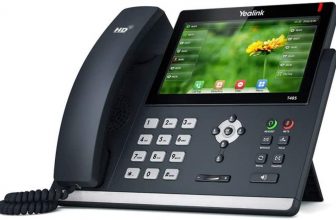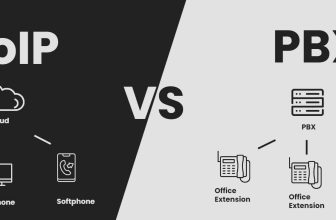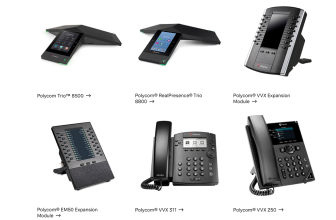If you are trying to find the best phone system for your business, you have probably heard about VoIP services and PBX services. What exactly does PBX stand for? A PBX system is a Private Branch Exchange. There are multiple options available, including traditional PBX systems and IP PBX systems. Clearly, there are some differences between them, so you need to figure out which one is best for your company. Remember that the right phone system for one small business is not necessarily the same as the right phone system for another.
Learn more about how a PBX system works, and find the right one to meet your needs.
An Overview of a PBX System
First, it is important to get an overview of a private branch exchange. This is similar to an internal telephone network that consolidates the phone lines and numbers of one business into a single, convenient system. It is possible for people to talk to one another using internal phone lines, but they can also send and receive external phone calls as well. Typically, a PBX comes with numerous optional features as well, including call transferring, call forwarding, voicemail features, and call queuing.
As alluded to above, there are numerous options for a PBX system. For example, there are traditional PBX systems that use physical phone lines that can be split into multiple options, creating more phone numbers. Then, there are IP PBX systems that are more dependent on the internet. These are similar to a VoIP phone system, so it is important for business owners to learn about the differences between a traditional PBX and an IP PBX.
The Types of PBX Systems
If you are thinking that a PBX system might be right for your business, it is important to understand the different options you have. The most common PBX options include:
A Traditional PBX
One of the most popular options is still a traditional PBX. When people think about an intra-office telephone system, this is usually what they think of. There are large cabinets, physical phone lines, and an on-site network. Phone calls, fax transmissions, and more can be handled using these physical phone lines. They handle outgoing calls, incoming calls, internal calls, and external calls.
A traditional PBX system may be a good option if you want to have all of your equipment on-site. If you already have an IT team that can help you handle this equipment, and if you believe your phone needs will remain relatively constant for the foreseeable future, then you may want to go with a traditional PBX system. Furthermore, if you are looking for a PBX system that will work even when you do not have internet access, then you may want to go with a traditional option.
On the other hand, if you are looking for phone systems for remote employees, or if you think your needs will change over time, then you may not want to go with a traditional PBX system, as you will be limited by physical phone lines.
An IP PBX
If you are looking for a more advanced option, then you might be curious about an IP PBX. As the name suggests, this is a system that relies on the internet to run your phone system. One of the major advantages of using an IP system is that you do not have to worry about having physical phone lines and large cabinets on-site. You have less equipment, so your upfront expenses should be lower.
Furthermore, you should also be able to scale your phone plan up and back with ease. If you think your phone needs might change quickly, then you might want to go with an IP PBX system. You can simply change your subscription plan instead of having to put in new phone lines.
Even though the flexibility of an IP PBX is nice, there are a few drawbacks as well. If you don’t have enough bandwidth for your phone calls, then your call quality could suffer. Furthermore, if your internet goes out, you might not be able to make phone calls. You also need to make sure you have strong cybersecurity measures in place.
The flexibility of an IP PBX system is one of the major features, but you need to think about whether you want to have an on-premises PBX or a cloud PBX. If you want to have control of your networks and servers, then you may want to go with an on-premises PBX. If you don’t want to worry about this type of maintenance, then you may be better off with a cloud PBX.
What Are the Benefits of a Traditional PBX System?
Clearly, you have multiple options available, so you need to think about which one is best for your company. What are the benefits of a traditional PBX system?
Some of the biggest benefits you should keep in mind include:
- Even though a traditional PBX system has higher upfront expenses, it has lower operational costs in the long run.
- You have additional control over your phone plan because you own your equipment.
- If you value your relationship with your telephone company, then you may want to go with a traditional PBX system.
- A traditional PBX system is also more secure because all of the equipment is contained. You control your level of security, as your phone system is not hosted in a far-off cloud.
- You should still be able to make phone calls even if the internet goes down.
If these benefits are important to you, then you may want to go with a traditional PBX system.
What Are the Benefits of an IP PBX System?
On the other hand, there are a lot of companies that are deciding to go with an IP PBX system. Some of the biggest benefits to note include:
- This plan is more scalable because you do not have to worry about purchasing new physical phone lines if you need to increase the phone numbers you have.
- If you have remote or mobile workers, you can keep them on the same plan because it runs using the internet.
- You have access to advanced features including video conferencing, instant messaging, and screen-sharing as long as these are included in your plan.
- You have the option of having networks and servers on-site or going with a cloud plan.
- You can also integrate an IP PBX system with other third-party systems, including your CRM or Microsoft Teams.
Think about these benefits carefully when you are trying to decide which PBX or VOIP phone is right for your company.
How Do I Choose the Right PBX System for My Company?
A PBX is a popular option for a small business phone system, but there are plenty of choices available. Even though these choices are nice, it can be difficult to decide which one is best for your company. You need to think about your specific needs, compare them to the benefits and drawbacks of each option available, and then make a decision. If you are trying to find the best PBX phone system for your company, consider reaching out to a professional service that can assist you.






